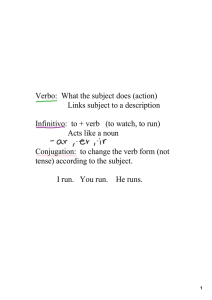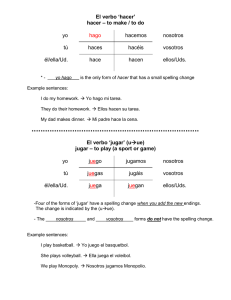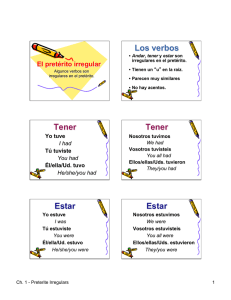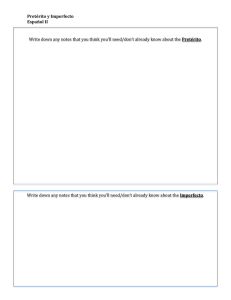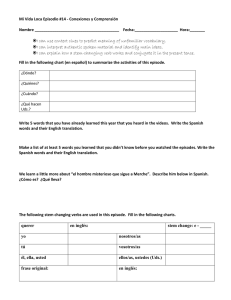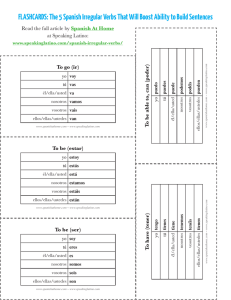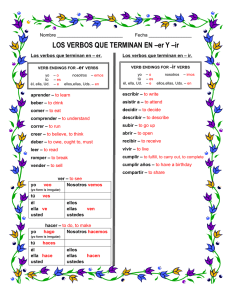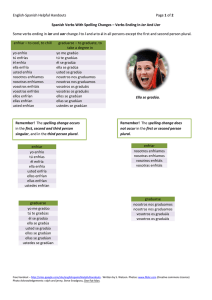Pretérito verbos irregulares -AR –ER –IR
Anuncio
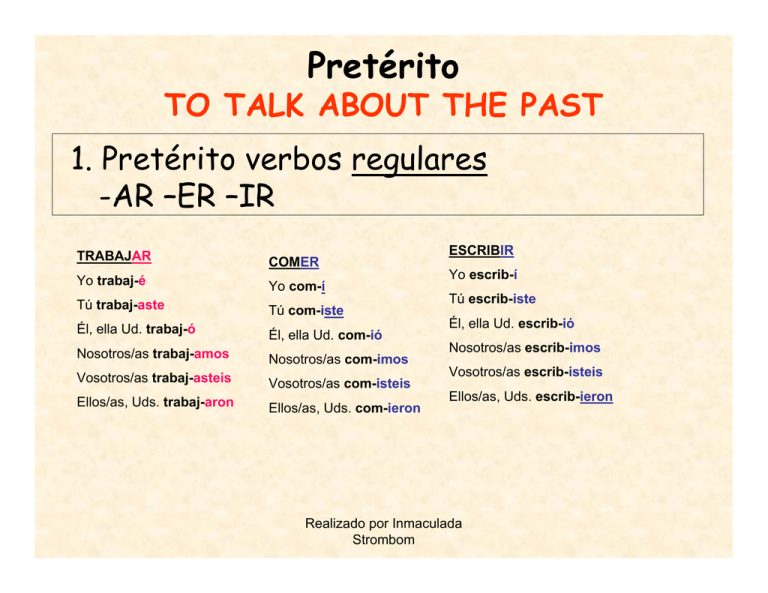
Pretérito TO TALK ABOUT THE PAST 1. Pretérito verbos regulares -AR –ER –IR TRABAJAR COMER Yo trabaj-é Yo com-í Tú trabaj-aste Tú com-iste Él, ella Ud. trabaj-ó Él, ella Ud. com-ió Nosotros/as trabaj-amos Nosotros/as com-imos Vosotros/as trabaj-asteis Vosotros/as com-isteis Ellos/as, Uds. trabaj-aron Ellos/as, Uds. com-ieron ESCRIBIR Yo escrib-í Tú escrib-iste Él, ella Ud. escrib-ió Nosotros/as escrib-imos Vosotros/as escrib-isteis Ellos/as, Uds. escrib-ieron Realizado por Inmaculada Strombom Pretérito TO TALK ABOUT THE PAST 2. Pretérito stem-changing verbs –IR (e → i / o → u; 3ª persona singular y plural) ► ► e→i o→u SERVIR MORIR Yo SERV-í Yo MOR-í Tú SERV-iste Tú MOR-iste Él, ella Ud. SIRV-ió ► Él, ella Ud. MUR-ió Nosotros/as SERV-imos Nosotros/as MOR-imos Vosotros/as SERV-isteis Vosotros/as MOR-isteis Ellos/as, Uds. SIRV-ieron ► PEDIR PREFERIR REPETIR SEGUIR CONSEGUIR DESPEDIRSE SENTIRSE IRSE Realizado por Inmaculada Strombom Ellos/as, Uds. MUR-ieron DORMIR/SE Pretérito TO TALK ABOUT THE PAST 3. Pretérito verbos irregulares SER / IR TENER VENIR DAR PODER TRAER HABER PONER CONDUCIR SABER TRADUCIR QUERER DECIR HACER ESTAR Realizado por Inmaculada Strombom Imperfecto TO TALK ABOUT THE PAST 1. Imperfecto verbos regulares -AR –ER –IR TRABAJAR COMER ESCRIBIR Yo trabaj-aba Yo com-ía Yo escrib-ía Tú trabaj-abas Tú com-ías Tú escrib-ías Él, ella Ud. trabaj-aba Él, ella Ud. com-ía Él, ella Ud. escrib-ía Nosotros/as trabaj-ábamos Nosotros/as com-íamos Nosotros/as escrib-íamos Vosotros/as trabaj-abais Vosotros/as com-íais Vosotros/as escrib-íais Ellos/as, Uds. trabaj-aban Ellos/as, Uds. com-ían Ellos/as, Uds. escrib-ían Realizado por Inmaculada Strombom Imperfecto TO TALK ABOUT THE PAST 2. Imperfecto verbos irregulares IR SER VER Yo IBA Yo ERA Yo VEÍA Tú IBAS Tú ERAS Tú VEÍAS Él, ella Ud. IBA Él, ella Ud. ERA Él, ella Ud. VEÍA Nosotros/as ÍBAMOS Nosotros/as ÉRAMOS Nosotros/as VEÍAMOS Vosotros/as ÍBAIS Vosotros/as ÉRAIS Vosotros/as VEÍAIS Ellos/as, Uds. IBAN Ellos/as, Uds. ERAN Ellos/as, Uds. VEÍAN Realizado por Inmaculada Strombom • Usos Imperfecto To DESCRIBE actions in the past which are seen by the speaker (at that time in the past) IN PROGRESS. Cuando bajaba la escalera, lo vi por primera vez. (When I was going downstairs I saw him for the first time) HABITUAL ACTIONS in the past. Pretérito Siempre íbamos al parque los domingos. (We always went to the park on Sundays) Usos TELLING TIME in the past. Eran las tres y media. (It was 3:30) 1. To TALK about actions in the past which are seen by the speaker as AGE in the past. COMPLETED (at that time in the past). Los niños tenían seis años. (The children were six years old). Cuando bajé la escalera lo vi por primera vez. CHARACTERISTICS in (WhenPHYSICAL I went downstairs, I saw him for the first time) the past. (DESCRIPTION people, things, places …) Era alto y guapo. (He was tall and handsome) 6. MENTAL OR EMOTIONAL STATES in the past. Él quería mucho a su familia. (He loved his family very much). Realizado por Inmaculada Strombom PRETÉRITO vs IMPERFECTO PRETÉRITO – Usos: IMPERFECTO – Usos: 1. 1. 2. 3. To TALK about actions in the past which are seen by the speaker as COMPLETED (at that time in the past). Cuando bajé las escaleras lo vi por primera vez. (When I went downstairs, I saw him for the first time) Cuando bajaba las escaleras, lo vi por primera vez. (When I was going downstairs , I saw him for the first time) To VALUE events, activities, situations, people, 2. etc., in the past. HABITUAL ACTIONS in the past. La fiesta estuvo fantástica. (The party was great) Dalí fue un pintor magnífico. (Dalí was a magnificent painter) 3. ACTION that INTERRUPTS another action (imperfecto) in the past. 4. porque + imperfecto como + imperfecto TELLING TIME in the past To DESCRIBE CONTEXTS, SITUATIONS, CIRCUMSTANCES) Era de noche y hacía mucho calor. El mar estaba tranquilo y no se escuchaba ningún ruido. (It was at night and it was very hot. The sea was quite and you could hear no noise) CONSEQUENCE in the past. Fui a Kenia porque quería hacer un safari. (I went to Kenia because I wanted to go on a safari) Como quería hacer un safari fui a Kenia (For I wanted to go on a safari, I went to Kenia) Siempre íbamos al parque los domingos. (We always went to the park on Sundys) Eran las tres y media. (It was 3:30) Sonó el teléfono cuando cocinaba (The phone rang when I was cooking) 4. To DESCRIBE actions in the past which are seen by the speaker as (at that time in the past) IN PROGRESS. 5. PHYSICAL CHARACTERISTICS in the past. (DESCRIPTION people, things, places, etc.) Era alto y guapo. (He was tall and handsome) 6. AGE in the past. Los niños tenían seis años. (The children were six years old) 7. MENTAL O EMOTIONAL STATES in the past. Él quería mucho a su familia. (He loved his family very much) 8. ACTION that IS INTERRUPTED by another action (pretérito) in the past. Él cocinaba cuando sóno el teléfono. (He was cooking when the phone rang) 9. REASON / CAUSE in the past. Fui a Kenia porque quería hacer un safari. Como quería hacer un safari fui a Kenia Realizado por Inmaculada Strombom
